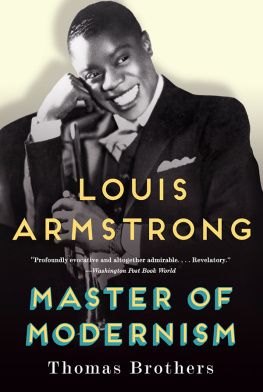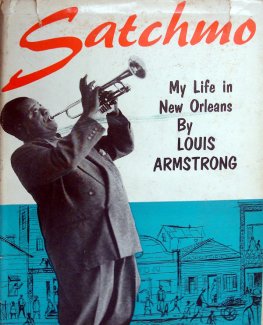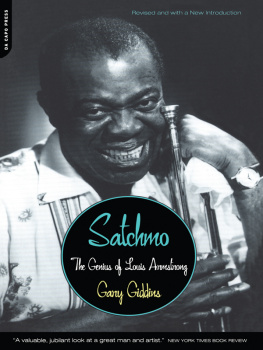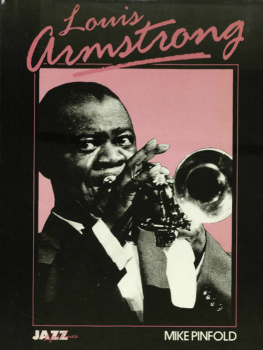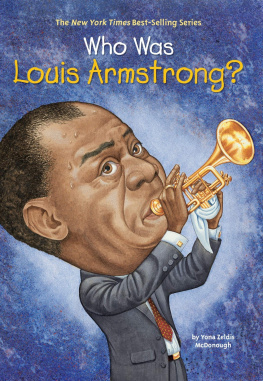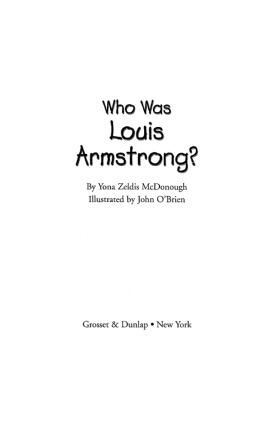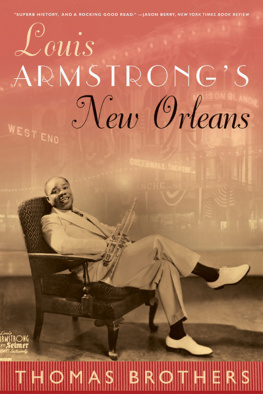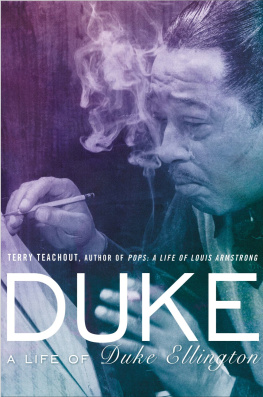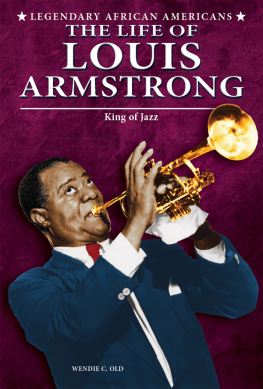Louis Armstrong and the All Stars, 1965
Dont look for obscure formulas, nor for le mystre. It is pure joy Im giving you.
CONSTANTIN BRANCUSI
Contents
A Note on the Text
L OUIS ARMSTRONGS LETTERS and autobiographical manuscripts are composed in an untutored, orthographically idiosyncratic style that is part of their charm. I have left this aspect of his writing mostly untouched. All misspelled words and proper names found in direct quotations from Armstrongs writings are printed as they appear in the original documents. The only changes I have made are to replace his underscoring with italicization and to delete many of the mysterious apostrophes with which he littered his typewritten texts. (Readers wishing to see how Armstrong used apostrophes should consult Louis Armstrong, in His Own Words, in which Thomas Brothers describes and analyzes his orthographic practices.)
Song titles are placed inside quotation marks. The titles of longer works are italicized. All references to musical pitches and key signatures are given at concert pitch. The phrase todays dollars refers to the value of the dollar in 2007.
Because most of Armstrongs key recordings have been reissued countless times in various formats, this book does not contain a discography. A comprehensive listing of Armstrongs known recordings can be found in Jos Willemss All of Me: The Complete Discography of Louis Armstrong.
First published in 2009
by Aurum Press Ltd, 7477 White Lion Street, London N1 9PF
www.aurumpress.co.uk
This eBook edition first published in 2014
Copyright Terry Teachout 2014
All rights reserved
This eBook is copyright material and must not be copied, reproduced, transferred, distributed, leased, licensed or publicly performed or used in any way except as specifically permitted in writing by the publishers, as allowed under the terms and conditions under which it was purchased or as strictly permitted by applicable copyright law. Any unauthorised distribution or use of this text may be a direct infringement of the authors and publishers rights, and those responsible may be liable in law accordingly
eBook conversion by Quayside Publishing Group
Digital edition: 978-1-78131-339-8
Softcover edition: 978-1-90677-956-6
Book design by Victoria Hartman
The text of this book is composed in Janson.
Photo credits appear on .
To Hilary,
my inspirator
PROLOGUE
The Cause of Happiness
N EW YORK WAS ABOUT to rip up its cultural map in the summer of 1956, and few of the citys residents knew how dramatic the changes would be. The Guggenheim Museum was still a blueprint; Lincoln Center, an uncleared slum. New York City Ballet danced at City Center, while the Metropolitan Opera continued to perform at its decaying house on 39th and Broadway, a few steps away from the theater district. The New York Philharmonic played at Carnegie Hall, but you could also ride the subway eighty blocks north to Lewisohn Stadium in July and August and pay thirty cents to hear the orchestra. (The cheap seats at Carnegie Hall cost $1.50.) The Philharmonics old summer home, a hulking neo-Grecian amphitheater built in 1915, is gone now, razed to make room for the North Academic Center of the City College of New York, with nothing left to mark its existence but a plaque. Only concertgoers of a certain age can remember traveling uptown to hear the orchestra accompany such soloists as George Gershwin, Marian Anderson, Van Cliburnand Louis Armstrong, who made his Philharmonic debut at Lewisohn Stadium on July 14, 1956, playing W. C. Handys St. Louis Blues for a crowd of 22,500 with Leonard Bernstein on the podium, Handy in the audience, and a CBS camera crew and a Columbia recording team on hand to document the event for posterity. It was the first time that the most famous of all jazz musicians had played with a symphony orchestra, and it was, he said, a dream come true.
The performance, like so much else in Armstrongs life, was an inspired improvisation. See It Now, Edward R. Murrows TV newsmagazine, had been following the trumpeter around Europe, filming the concerts he was giving as an unofficial ambassador of American goodwill. His travels had caught the eye of the New York Times, which ran a front-page story informing its readers that Americas secret weapon [in the Cold War] is a blue note in a minor key. Right now its most effective ambassador is Louis (Satchmo) Armstrong. To be associated with so popular a figure could do Murrow nothing but good, for his outspoken reports about McCarthyism had gotten the newscaster into trouble with his bosses at CBS, and Fred Friendly, the producer of See It Now, was eager to leaven the loaf with programs on less controversial topics. They had already aired Two American Originals, a dual profile of Armstrong and Grandma Moses, and the sober-sided Murrow, though he knew nothing about jazz, had been charmed by Armstrong when the two men chatted on camera at a Paris nightclub:
MURROW: Is there any relation between gutbucket and boogie-woogie?
ARMSTRONG: Oh, I dont think so, Mr. Murrow. Theyre bothrhythmatical. Did that come out of me?
MURROW: Louie, Ive been meaning to ask you this. Whats the meaning of a cat?
ARMSTRONG: Cat? Cat can be anybody from the guy in the gutter to a lawyer, doctor, the biggest man to the lowest man, but if hes in there with a good heart and enjoy the same music together, hes a cat.
Now Murrow and Friendly wanted to expand the See It Now segment into a theatrical documentary called The Saga of Satchmo (it was released in 1957 as Satchmo the Great) that would include additional footage of Armstrongs CBS-sponsored visit to Ghana, where the All Stars, his six-piece band, had played in May for a hundred thousand ecstatic listeners. All that was missing was a grand finale, and when Friendly learned that Lewisohn Stadium was planning to present its first all-jazz concert, a joint appearance by the All Stars and the Dave Brubeck Quartet, he called up George Avakian, Armstrongs producer at Columbia Records, and started peppering him with questions. George, Armstrong was born on the Fourth of July, right? (He wasnt, but no one, not even Armstrong himself, knew it at the time.) Will Leonard Bernstein still be conducting at Lewisohn Stadium then? You know himhow about getting him to invite Louis to play with the Philharmonic on his birthday? Would he do it? What would they play? Avakian hastened to assure Friendly that Bernstein, who had hosted a well-received TV show about jazz the preceding October, would be happy to share a stage with Armstrong, and that the Philharmonic would likely have an arrangement of St. Louis Blues in its library. He was right on both counts: Bernstein agreed at once, and the Philharmonics librarian dredged through the files and found a version of St. Louis Blues arranged by Alfredo Antonini, a staff conductor at CBS. The date of the concert had to be moved to July 14, but Murrow and Friendly got everything else they wanted.


